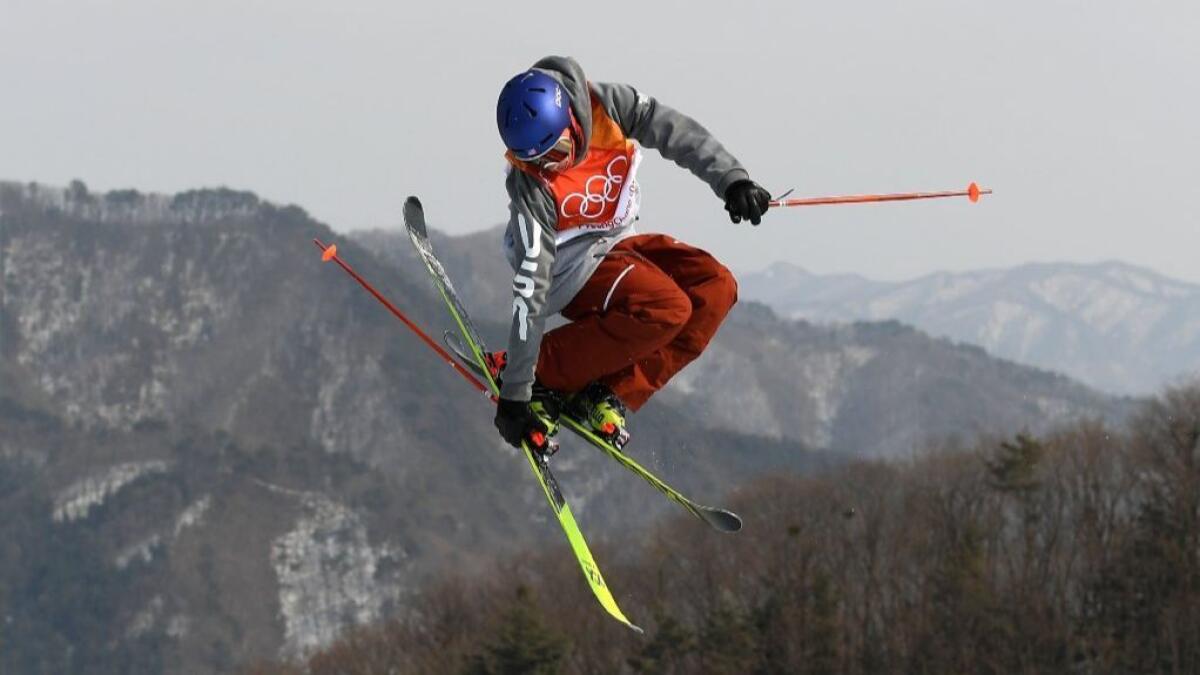Column: Post-Olympic letdown nearly drove Nick Goepper to take his own life. After a silver at Pyeongchang, he knows what’s next
- Share via
Concerns raised about the Olympics often center on the places that stage the Games, specifically what will happen to these debt-ridden municipalities when the festival leaves town. Less talked about is what happens to the athletes when they leave the Olympics.
Over the last four years, freestyle skier Nick Goepper lived through the worst-case scenario. The post-Olympics blues he experienced following the Sochi Games were severe enough to where he contemplated suicide.
Goepper did something Sunday he didn’t think possible when he was at his lowest point, returning to the Olympic medal podium by claiming silver in the slopestyle competition.
“I’m super proud just to be where I am today,” he said.
The 23-year-old believes he is ready this time to deal with what comes next.
Goepper won’t be alone. The cycle is the same for most of the athletes here. They devote years to reach these Games, their reward a two-week stay at the center of the world. But the Olympics end, and there’s only one way to go from the top of a mountain: down. The Shaun Whites and the Lindsey Vonns emerge as household names and land major endorsement deals. The others return to life as it used to be. In some instances, the single-minded focus that drove them to the Olympics is replaced by a lack of direction and a search for something meaningful beyond the Games.
That’s where Goepper found himself four years ago after he won a bronze medal in Sochi. The spiritual crisis followed a weeklong media blitz in New York, with fellow slopestyle medalists Joss Christensen and Gus Kenworthy.
“How’s that saying go?” Goepper asked rhetorically. “Fail to plan, then you’re planning to fail? I just really had no plan after Sochi. I was partying a lot with my friends and kind of just flying into this void and three weeks after the Olympics, I was like, ‘What am I doing?’”
Goepper started drinking heavily.
“That was a symptom of the problem, for sure,” he said. “Unfortunately, that symptom got pretty bad at one point.”

His despair intensified.
“I pretty much had given up on skiing altogether and had given up on myself and basically wanted to end it,” Goepper said.
He thought about legendary aerial skier Jeret “Speedy” Peterson, a three-time Olympian who died in 2011 of a self-inflicted gunshot wound.
Goepper had only one encounter with Peterson and found him as charming as others said he was. Peterson showed Goepper his silver medal from the 2010 Vancouver Games.
“You want to know what you can do with this thing?” Peterson asked.
“What?” Goepper replied.
“You can’t imagine all the chicks you’re going to get,” Peterson said.
Telling the story Sunday brought a smile to Goepper’s face. But that smile vanished as Goepper referenced Peterson’s problems, which included a traumatic childhood, the witnessing of a roommate’s suicide and the inability to figure out his post-Olympic life.
“I think I paralleled some of my struggles with his story,” Goepper said.
So much so that Goepper retraced Peterson’s finals steps, driving to Lambs Canyon, a remote area outside of Park City, Utah.
“I went to the exact place where he had committed suicide and just sat there, contemplating it myself in my car,” Goepper said.
At the insistence of his family, Goepper checked into a rehabilitation facility in the summer of 2015. He hasn’t had a drink in 2½ years.
“I’m just really glad that I got the help that I needed and to be here living, experiencing all this, with a different outlook and perspective and more maturity,” he said.
He landed on the podium in dramatic fashion. He was seventh in the 12-man field after two runs. He scored 93.60 points on his third and final run to move into second place.
His parents, three siblings and girlfriend were there cheering him on. Goepper said they are part of the support system. In addition to their support, Goepper said he has found solace in trying to help others by sharing his story.
“It also really helps with the healing process, talking about that stuff, making it known,” Goepper said.
Goepper plans to combat the anticipated post-Olympic letdown by staying active instead of self-medicating with alcohol.
“I’d like to keep skiing, I’d like to keep competing a little bit more these next few weeks, do the big media obligations and the stuff that’s really important and just keep working,” he said.
He doesn’t plan on getting lost again. He has somewhere to go this time: the 2022 Beijing Games.
Follow Dylan Hernandez on Twitter @dylanohernandez
More to Read
Go beyond the scoreboard
Get the latest on L.A.'s teams in the daily Sports Report newsletter.
You may occasionally receive promotional content from the Los Angeles Times.







